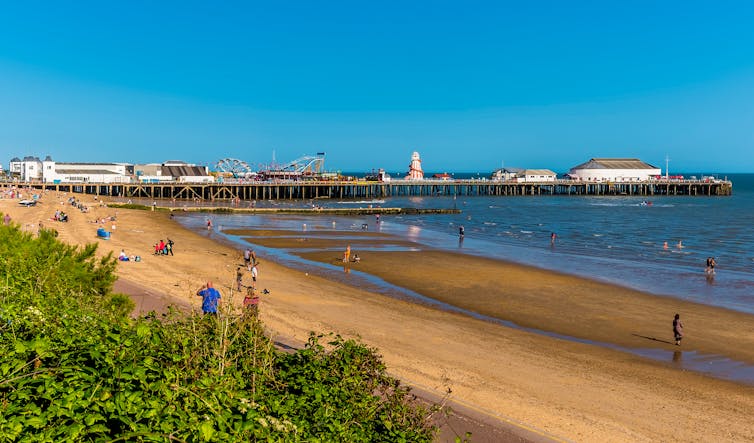Nigel Farage is back. The newly appointed leader of the Reform UK party has just announced his intention to run to be the MP for the Essex seaside town of Clacton – the only constituency to have ever elected an MP from Farage’s former party UKIP in a general election.
Farage announced his candidacy by making a speech from London, in which he lent heavily on the kind of rhetoric that mobilised millions of British people in support of Brexit. Farage has long emphasised immigration and the alleged incapacity of Labour and Tories to stop it.
He also made reference to other traditional populist motifs, including excessive taxation and soaring crime, claiming that in modern Britain “you can go shoplifting and nick up to 200 quid’s worth of kit before anyone is even going to prosecute you”.
To bundle together these issues, Farage used the wider theme of national decline.
There followed a lengthy tirade about young people not knowing what D-day was, apparently based on a recent poll by the Commonwealth War Graves Commission that found more than half of people aged 18-34 aren’t sure what happened on D-day.
This, for Farage, is emblematic of an “economic”, “social” and even “moral” decline. He harkened back to D-day as a moment of British pride, emphasising how the nation is now far short of that moment.
He chose this approach, reflecting on the past rather than the future, because the theme of national decline resonates loudly among people with rightwing inclinations. Research in political science has widely documented that people on the right are more nostalgic about the past than people on the left. It is more common for people on the right to want to go back to the old days – think for instance of Donald Trump’s famous slogan “Make America great again”.

Research has shown that the right’s nostalgia for the past has a specific communitarian flavour. It is based on longing for a time when communities were more united, ordered and respectful of traditions. For someone adopting this narrative, it is all too easy to be persuaded that immigration is the root cause of why the community has lost its original cohesion.
Politicians who adopt this view can style themselves as the only people who can rescue the country, the only people who truly remember how good things used to be and the only people who understand how bad things have become now. They can then present themselves as the leaders who would have the will and the strength to bridge the chasm between then and now.
In his speech, Farage offered himself as the leader of just such a movement – of citizens who are aware of the decline and who are willing to resist it. In the long run, the call is to unite in the interests of reconstructing Britain as it was in the glory days.
Different world views
While politicians on the right stress decline, research in political science has observed a more future-oriented outlook on the left in many countries, including the UK. Typically, leftwingers are not as fond of the past, but are more optimistic than rightwingers about what society can achieve in the future.
Want more general election coverage and analysis from The Conversation’s academic experts?
Sign up for our new, weekly UK politics newsletter, delivered every Friday throughout the campaign and beyond.
Overall, then, research suggests that rightwingers and leftwingers view the story of their country very differently. The right views this story as one of decline to be stopped, the left as one of potential for progress that needs to be grasped. Farage and Reform UK have realised that after 14 years in charge of the country, the Tory’s appeal among those who embrace the decline perspective may be waning.
Farage is in a position to capitalise on the fact that he is not stained by the tumultuous years of Tory government. He is still viewed by many as the man who led the people during one of the greatest political triumphs in recent times – the vote to leave the European Union in 2016. Farage said in his speech that since that moment “something has gone very, very wrong”.
Farage of course poses the most significant threat to the Tories, as his candidacy creates competition on the right. Reform UK could split the vote in some seats and Farage could win his.
However, Farage’s use of the narrative of decline could cause problems for Labour, too. The party is aiming to recapture red wall constituencies where the decline story has significant traction. Farage claimed in his speech that he believes his party “might just surprise everybody” in this region.
More broadly, Farage’s return is likely to polarise the campaign. The threat posed by Reform is already leading the Tories to adopt more extreme positions on issues such as gender identity and climate change, apparently in the hope of assuring voters they are no less radical than Farage.
We should, therefore, brace for the battle between the “stop the decline” and the “struggle for a better future” narratives to ramp up now that Farage has entered the campaign as a candidate. He has, after all, claimed that he intends to lead “a revolt”.
Francesco Rigoli does not work for, consult, own shares in or receive funding from any company or organisation that would benefit from this article, and has disclosed no relevant affiliations beyond their academic appointment.
This article was originally published on The Conversation. Read the original article.







